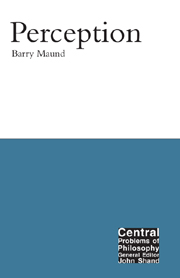Book contents
- Frontmatter
- Contents
- Preface
- 1 The philosophy of perception
- 2 A theory of natural realism
- 3 Theories of perceptual experiences
- 4 Representationalism: representations as natural signs
- 5 Natural realism: Putnam, Austin and Heidegger
- 6 Perception: the argument from illusion
- 7 The phenomenal and phenomenological senses of “looks”
- 8 Types of perceptual content
- 9 The representationalist–intentionalist thesis
- 10 Adverbialist accounts of perceptual experience
- Conclusion
- Notes
- References
- Index
Preface
- Frontmatter
- Contents
- Preface
- 1 The philosophy of perception
- 2 A theory of natural realism
- 3 Theories of perceptual experiences
- 4 Representationalism: representations as natural signs
- 5 Natural realism: Putnam, Austin and Heidegger
- 6 Perception: the argument from illusion
- 7 The phenomenal and phenomenological senses of “looks”
- 8 Types of perceptual content
- 9 The representationalist–intentionalist thesis
- 10 Adverbialist accounts of perceptual experience
- Conclusion
- Notes
- References
- Index
Summary
The philosophical issues raised by perception make it one of the central topics in the philosophical tradition. Debate about the nature of perceptual knowledge and the objects of perception comprises a thread that runs through the history of philosophy. In some historical periods the major issues have been predominantly epistemological, and related to scepticism, for example, to doubts raised over whether we have knowledge of the objects that we take ourselves to perceive, and that we ordinarily take to exist independently of us. But an adequate understanding of perception is important more widely, for example, for metaphysics, philosophy of mind, philosophy of language and philosophy of science.
Even for epistemology, there are issues wider than those of sceptical doubt. For example, given that we do have knowledge, we are faced with such questions as: what do we have knowledge of? What grounds for knowledge do we actually apply? How do we acquire this knowledge? And to answer these questions an account of the role of perception is important.
Such issues, moreover, run into those discussed in metaphysics and the philosophy of mind and language. Central are such questions as: are the objects of perception mental or material? Do these objects exist independently of the act of perceiving or are they constructed? What is the nature and role of perceptual experience? What is the role of thought in perception? Of concepts? What role does perception and perceptual experience play in thought? What are sensations and what role do they play in perception?
- Type
- Chapter
- Information
- Perception , pp. ix - xPublisher: Acumen PublishingPrint publication year: 2002

